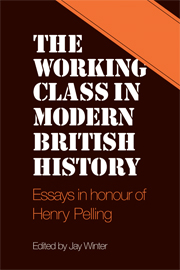Book contents
- Frontmatter
- Contents
- Introduction: labour history and labour historians
- I The working class in British politics
- II The working class in British society
- 7 Work and hobbies in Britain, 1880–1950
- 8 Credit and thrift and the British working class, 1870–1939
- 9 Intelligent artisans and aristocrats of labour: the essays of Thomas Wright
- 10 Anglo-Marxism and working-class education
- 11 Did British workers want the welfare state? G. D. H. Cole's Survey of 1942
- 12 Images of the working class since 1930
- 13 Unemployment, nutrition and infant mortality in Britain, 1920–50
- List of the published writings of Henry Felling
- Notes
- Index
13 - Unemployment, nutrition and infant mortality in Britain, 1920–50
Published online by Cambridge University Press: 05 November 2011
- Frontmatter
- Contents
- Introduction: labour history and labour historians
- I The working class in British politics
- II The working class in British society
- 7 Work and hobbies in Britain, 1880–1950
- 8 Credit and thrift and the British working class, 1870–1939
- 9 Intelligent artisans and aristocrats of labour: the essays of Thomas Wright
- 10 Anglo-Marxism and working-class education
- 11 Did British workers want the welfare state? G. D. H. Cole's Survey of 1942
- 12 Images of the working class since 1930
- 13 Unemployment, nutrition and infant mortality in Britain, 1920–50
- List of the published writings of Henry Felling
- Notes
- Index
Summary
The paths of labour historians and demographic historians have crossed all too rarely in Britain. Part of the cause of separate but equal development is a barrier of mutual suspicion, largely based on misapprehensions, which should have been broken down long ago. Among some labour historians there is a profound distrust of quantification, either as the art of proving laboriously what we already know, or as a cult replete with mysteries into which all but initiates enter at their peril. Among demographic historians, the explicit political commitments of some historians of labour seem to violate canons of scholarly objectivity, as if population questions and policies had no ideological content.
The present plea for collaboration is based on the view that it is both profitable and necessary. Scholars in the fields of labour history and demographic history have distinctive contributions to make on many subjects of mutual interest. Among them is the history of the health of the working population. Demographic historians can learn much from studies of class structure about the changing meaning and complexity of the social and economic variables which they relate to vital statistics by means of sophisticated statistical analysis. Labour historians can learn much from demographic analysis about the costs of social inequality and the degree to which working people have managed to cope successfully with chronic deprivation and economic insecurity.
Scholars of both disciplines can also help in different ways to unravel the difficult problem of what is the appropriate time scale on which to analyse the relation between trends in public health and variations in levels of employment or income.
- Type
- Chapter
- Information
- The Working Class in Modern British HistoryEssays in Honour of Henry Pelling, pp. 232 - 256Publisher: Cambridge University PressPrint publication year: 1983
- 7
- Cited by

